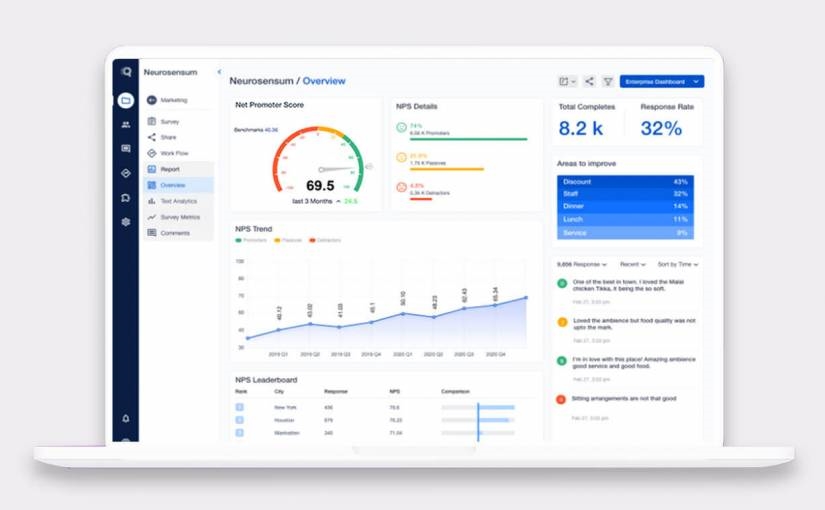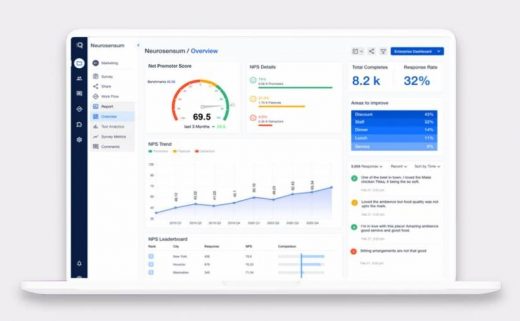A CEO’s Perspective on Net Promoter Score
A CEO’s Perspective on Net Promoter Score

What differentiates a great business from a good business is the power of customer loyalty and customer satisfaction. A great CEO understands how a satisfied and loyal customer can accelerate business expansion. They have transformed their companies into industry leaders by building loyal relationships with their customers and employees. They have used a magic metric the Net Promoter Score. To understand where their business is lagging and improved on it.
A CEO creates a benchmark for its organization and makes sure the brand promise is delivered.
Net Promoter Score
The Net Promoter Score is a simple business metric that gauges how well you are meeting your customers’ expectations. It offers a powerful lens into what customers think about your business and reveals what is wrong.
NPS is a robust and powerful solution to boost word-of-mouth marketing, increase customer satisfaction, reduce customer churn, and offer better customer experience.
The Three Categories of the Customers
The Net Promoter Score survey aims to ask one question to all its audience. ‘On the scale 0 to 10, how likely are you to recommend our company to your friends and family?’ and based on its answers, it measures the customer loyalty of your business.
Also, based on their scores, the customers are divided into three categories. That is, Promoters, Passives, and Detractors.
Promoters: They are the customers who gave a score of 9 or 10. They love your brand’s products and services and are the most loyal customers.
Passives: They are the customers who gave a score of 7 or 8. They are satisfied with your brand’s products or services but can switch to your competitor for a better offer.
Detractors: They are the customers who gave a score of 6 or below. They are not happy with your brand’s services and/or products and are most likely not willing to purchase from you again.
How do you calculate NPS?
Your company’s Net Promoter Score (surveysensum.com) can be calculated by simply subtracting the percentage of Detractors from the percentage of Promoters.
NPS (Net Promoter Score) = % Promoters – % Detractors
How can NPS Data help your Business?
The Net Promoter Score is an effective way to run a business. At the same time, many business leaders are skeptical about the effectiveness of NPS. Numerous studies have shown that high NPS can be directly linked to the growth of the company.
Here are the 5 crucial points about NPS data with industry leaders’ case studies that any business owner must know.
Reduction in Support Costs
The Net Promoter Score helps in reducing the business costs by identifying the pain areas of the customers, enabling the Support team to serve the customers better.
This results in a reduction in call times, improvement in satisfaction score, and an increase in the average number of calls handled at a time, which reduces the support costs of any business by a significant amount.
Symantec provides cybersecurity software to protect infrastructure networks, data, and communication. Along with security measures,
they also address any compliance, availability or performance risks. After adopting NPS in 2004, there has been a 50% increase in their product lines, a 30% reduction in support costs, and a significant increase in the number of positive reviews.
Increased interaction with Current and Prospective Customers
The NPS is a simple metric to track your position in the market. But what is significant is asking the right questions. Often small things have the most significant impact on the NPS, and it is by talking to your customers that you will understand the reasons behind brand loyalty.
Slack is a business communication platform that brings the communication of all the teams of a business on a single platform. Slack Team used the NPS to answer one question ‘Why should people recommend or not recommend your brand?’
They refined all the interaction with the current and prospective clients and tracked their progress with the Net Promoter Score, which resulted in a $ 1 billion valuation in one year through positive promotions tracked by NPS.
Work on the Detractors
After a Net Promoter Score survey, it is important to work on the Detractors of your business as their feedback offers an opportunity to improve your business and by analyzing their feedback with actionable insights.
You can fix some of your problems quickly or take a required action to improve your services or products.
Apple retail store managers, post their NPS survey, reached out to all of their detractors or dissatisfied customers within 24 hours and analyzed the purchase patterns of the detractors who spoke to store managers and who had not.
This survey resulted in additional revenue of more than $ 1,000 or $ 25 million in a year.
Work towards profitability
In the Harvard Business Review, it has been observed that the companies adopting the Net Promoter Score tend to grow twice the rate of their competitors than those who have not adopted NPS.
It has been recognized that businesses working on their NPS analysis have sustainable, profitable growth, which begins with creating more promoters and fewer detractors.
Philips Electronics used the NPS for a few of its accounts for some time and observed where the NPS increased. The revenue grew by 69%, where the NPS didn’t change, the revenue grew by 6% only, and where the NPS was not adopted, the revenue decreased by 24%.
Reduce your Customer Churn
Fred Reichheld created the Net Promoter Score (NPS) to measure the customer’s brand loyalty. The NPS measures customer experience and the likelihood of repeat business. Also, it is the only metric that evaluates the customer churn that helps in working against the inevitable failure.
Australian Based telecommunication company, Optus, posted a net profit of $ 227 million during the last quarter of 2013.
According to the Australian Business Review, the Country Chief Officer Kevin Russell has said that after they adopted the NPS in 2013, there has been a six-point increase in their Net Promoter Score over the December quarter. That was a 50% decrease in the customer complaint,s which resulted in a 41% increase against the last quarter of 2012.
Conclusion
The Net Promoter Score is the one number that you need to grow. It is a simple, profound, and effective way to reduce customer churn, improve loyalty, and word-of-mouth marketing, which leads to great profits.
Conducting a survey and gathering data is the first step. The companies that have grown their revenue with the NPS implementations have analyzed this data. And took actions to convert detractors to promoters while improving customer experience.
The post A CEO’s Perspective on Net Promoter Score appeared first on ReadWrite.
(40)


